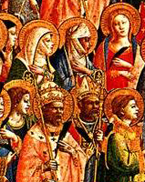 We often say we incarnate Eastern and Oriental Christianity in Western cultural practices. What do we mean by this? The history of how what we now call "east", "west" and "oriental" references the division of the Roman Empire in Eastern and Western halves by Diocletian in 293 and those places beyond Rome’s borders to the East (Orient).
We often say we incarnate Eastern and Oriental Christianity in Western cultural practices. What do we mean by this? The history of how what we now call "east", "west" and "oriental" references the division of the Roman Empire in Eastern and Western halves by Diocletian in 293 and those places beyond Rome’s borders to the East (Orient).
While it is something of an oversimplification, we may say that the Western church tradition tends to value precision, legal clarity, minute explanation of doctrine, and an absolute and knowable "truth." Logic rules. This is part and parcel of the Greco-Roman philosophical and theological mind.
The Eastern churches, whether inside the Roman Empire (Byzantine) or outside it (Oriental), resisted this tendency somewhat. One may say that in the East, it was not logic that ruled but mystery. The Eastern ways of doing theology allows for more ambiguity, even outright disagreement. It is no accident that many of the great theological authorities of the Eastern traditions expressed their teaching in poetry, like St. Gregory the Theologian in Greek and St. Ephrem the "Harp of the Spirit" in Syriac.
This is how we approach the world in OCCA: we allow ambiguity, mystery, and even sometimes disagreement. We know that God is beyond our ability to comprehend in words or definitions. Our Eastern traditions understand that all our statements about God fall short of complete truth. This can be seen especially in the many Eastern prayers and hymns that rely for their meaning on paradoxes, such as Mary being both virgin and mother, or the infinite spiritual God taking the body of a single individual human being. Similarly, for us "going to confession" (which is a personal choice) is about healing and growing toward God and each other. It is not a judicial proceeding.
In short, we remind ourselves that the English words holy, healthy, and whole are all from the same root. For us the Church is a hospital, or a shelter along the way, not a club with a set of rules and regulations you must follow or you get thrown out. In fact, we see as our special role in the world to make welcome those who find themselves spiritually homeless because of their experiences of rule-based expressions of church.
We hold to the Gospel's idea of human nature as not utterly ruined by Adam's disobedience. We don't share the idea of "original sin," which is a Western theological idea only. We are still and always made in the image of God. We maintain the Pauline idea of baptism as "putting on Christ." The work of our lives is not to avoid damnation by an angry God (who does not exist), but to bring alive and perfect our new Christ-nature in our daily lives. It is our purpose and journey to become like God (Gk theosis). This means we can never be saved all alone.
Jesus's entire life, teaching, sufferings and death, and resurrection on the third day are all part of God's work among us and in us, to restore us and all creation to harmony and the embrace of a loving God. Jesus fulfilled his promise to send us a Comforter, the Holy Spirit, to guide the church and help each of us to live out the meaning of our baptism (with the sacraments or mysteries as sustenance along the way), until we enter into the Divine communion. This is what we mean by salvation.




